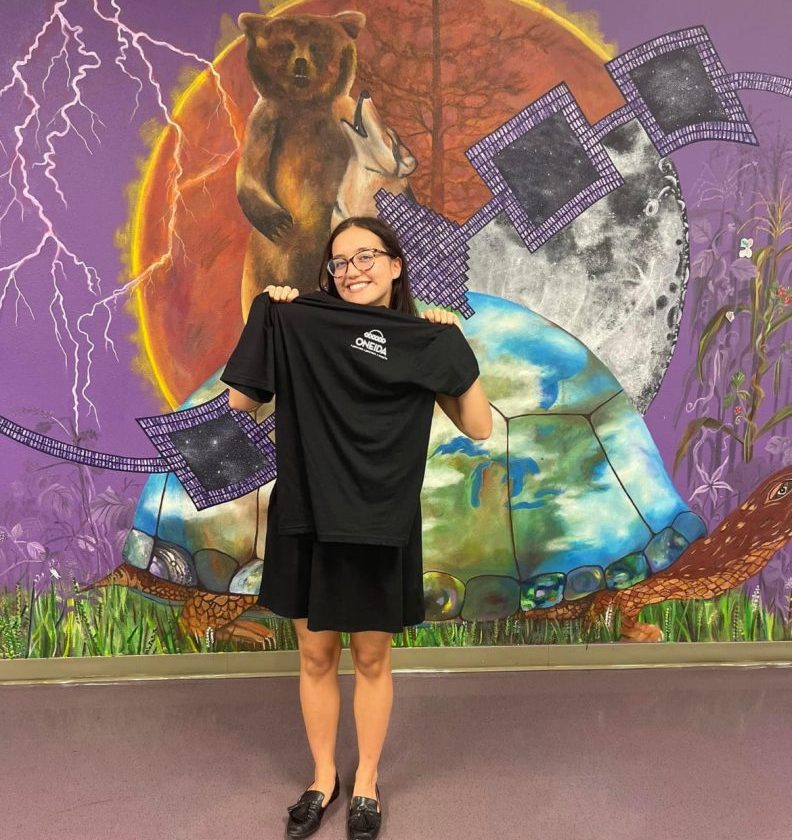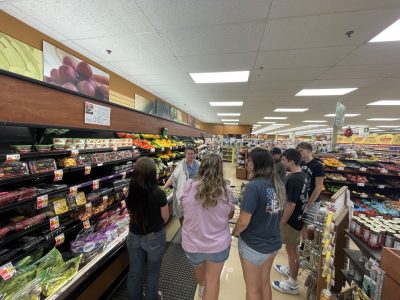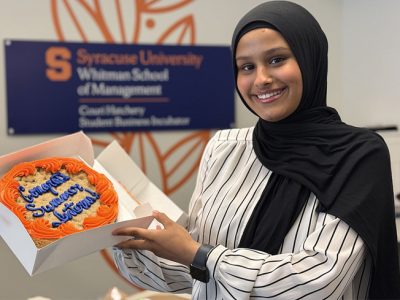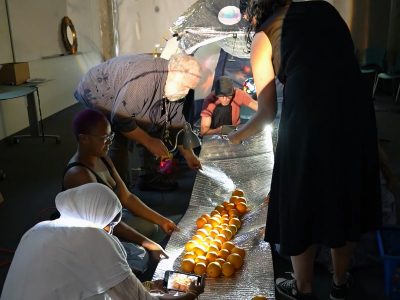‘We Are Not a People of the Past’: Not in the Books Project Builds Ties With Indigenous Community
Senior Isabelle Lutz joined a group of fellow Syracuse University students and community members for a short bus ride last fall to the Skä•noñh Great Law of Peace Center—the Haudenosaunee cultural hub on the shore of Onondaga Lake in Liverpool.
The evening’s event, part of a series called “Listen to the Elders,” featured Onondaga Hawk Clan Chief Spencer Ohsgoñ:da’ Lyons speaking about the history of the Haudenosaunee Confederacy and sharing the traditional Thanksgiving address. The gathering included an array of Haudenosaunee foods, including three sisters soup made with corn, beans and squash.
“We’re not a people of the past,” Lyons told the audience. “The Haudenosaunee are still the Haudenosaunee. We have our language; we have our songs.”
For Lutz, an enrolled member of the Oneida Nation in her home state of Wisconsin, the Skä•noñh event provided a chance to connect directly with Indigenous leaders in the Syracuse area.
“So much of Native American studies or Indigenous studies can be taught from a historical/past context, when the people, traditions, and cultures are still present and active in the community,” said Lutz ’24, who in May earned a bachelor’s degree in political science with a minor in Native American and Indigenous studies. “So, when there are opportunities to attend and listen to members of different nations share their story and knowledge, it truly complements and enriches my classroom studies.”
The “Listen to the Elders” series began in 2022, organized by a University group called Not in the Books, which fosters a reciprocal learning relationship between the University community and the peoples of the Haudenosaunee Confederacy.
The Maxwell School is strongly connected to the effort: two of its faculty members, Aaron Luedtke and Heather Law Pezzarossi, are among its key organizers and it is supported with funding from the Tenth Decade Project, an initiative created 10 years ago in the lead of to the school’s 100th anniversary (see related story: From Sovereignty to Mortality: Tenth Decade Awards Support Research Across Disciplines).
“The Tenth Decade awards have energized and enabled interdisciplinary research around critical themes to the Maxwell School,” says Carol Faulkner, professor of history and Maxwell’s senior associate dean for academic affairs. “‘Listen to the Elders’ engages the Syracuse community around issues of citizenship, democracy and environment. It is a particularly appropriate project for our centennial because it highlights how our present obligations as citizens are tied to our past.”
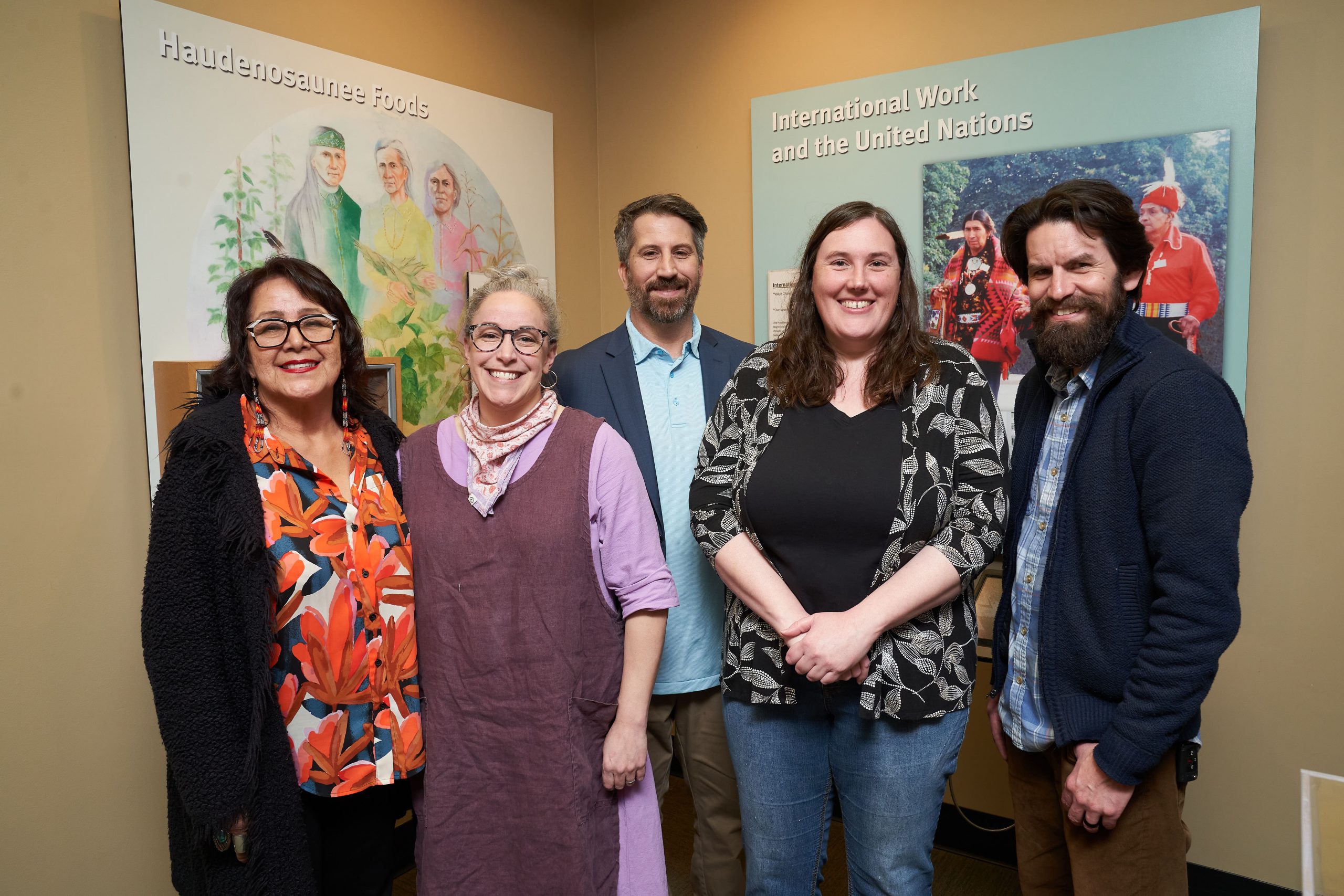
Indigenous Ties
The work of Not in the Books aligns with the teaching and research of Aaron Luedtke and Heather Law Pezzarossi.
Law Pezzarossi, an anthropologist trained in critical heritage studies, does collaborative work that addresses colonial history while serving the contemporary needs of Indigenous communities, such as the Nipmuc people of New England. Her teaching includes courses on contemporary Native American issues, and on Indigenous museum relations and Native Americans. She is a faculty affiliate in the Native American and Indigenous Studies Program and a member of the advisory board for the University’s new Center for Global Indigenous Cultures and Environmental Justice.
Luedtke, an assistant professor of history at Maxwell since 2022, is also a faculty affiliate with the Native American and Indigenous Studies Program. He focused his graduate research at Michigan State University on the native peoples of the Great Lakes—particularly, in his words, “how they used the authoring of their own histories as resistance to colonial erasure.”
The connections Luedtke has made with Syracuse-area Indigenous communities through Not in the Books and other projects are influencing his research direction. “I have the privilege to build these relationships with Haudenosaunee elders,” says Luedtke, who is of Suquamish and Duwamish descent. “I am going to spend the rest of my career working in tandem with the Haudenosaunee to tell Haudenosaunee stories of resistance.”
The impetus for creating the Not in the Books group initially came from Diane Schenandoah, Oneida Nation Faith Keeper and the University’s Honwadiyenawa’sek—or “one who helps them.” A sculptor for 40 years, she earned an art degree from the College of Visual and Performing Arts in 2011. Her daughter, Michelle Schenandoah, is a graduate of the S.I. Newhouse School of Public Communications and an adjunct professor in the law school, and her son-in-law, Neal Powless, serves as the University’s ombuds.
As Honwadiyenawa’sek, Schenandoah offers intuitive energy work grounded in traditional Haudenosaunee culture and teachings to the University community. She also leads events such as a Haudenosaunee welcome ceremony opening the academic year and a monthly full moon ceremony. “I was asked to be a Wolf Clan Faith Keeper in 1988,” she says. “As a Faith Keeper, part of my duty is to share our teachings of how to live in peace though gratitude. We have duties and responsibilities to one another as humans, and to our Mother Earth for all that is provided. Giving thanks on a daily basis is of great importance.”
Through her initial work on campus, Schenandoah began connecting with Native students as well as with professors, such as Luedtke, Law Pezzarossi, and Patricia Roylance, associate professor of English, who teach courses related to Native American and Indigenous studies.
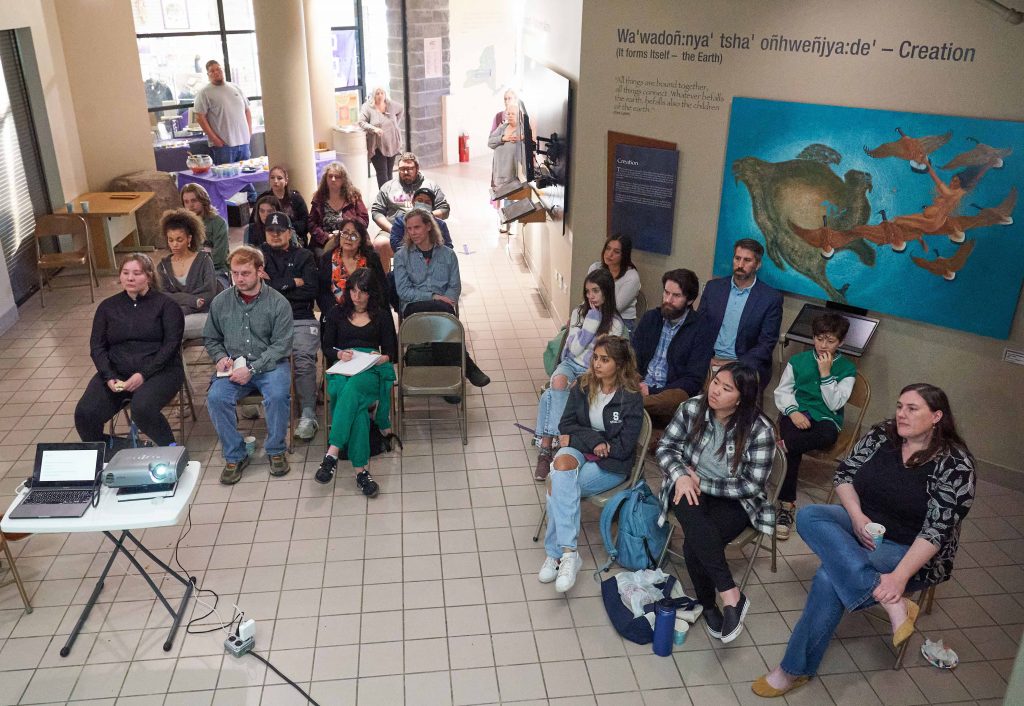
While students were clearly keen to learn more, many had little background on the impacts of colonialism and the dispossession of Indigenous lands, or on the persistence and current-day realities of Indigenous communities—topics rarely addressed in primary or secondary education. “As Indigenous people, our history is so erased,” Schenandoah says. “Many students see the purple and white flag flying around campus but don’t really know what it is. You’re standing in the capital of the Haudenosaunee Confederacy. This is the birthplace of democracy.”
Looking for ways to help fill this gap in knowledge and awareness of the area’s Indigenous heritage and contemporary presence—among not only students but faculty and staff—Schenandoah lit on the idea of connecting the University community with a tribal elder. She contacted Freida Jacques, Onondaga Turtle Clan Mother Whatwehni:neh. Jacques agreed to do a series of lectures, and the Not in the Books team—named by Schenandoah—coalesced to organize these events at Skä•noñh.
In addition to Luedtke, Law Pezzarossi, Schenandoah and Roylance, the Not in the Books team includes Scott Catucci, associate director of outdoor education at the Barnes Center; Jim O’Connor, producer with the special collections team at SU Libraries; and Tammy Bluewolf-Kennedy, a member of the Oneida Nation’s Wolf Clan who leads Indigenous student recruitment in the University’s Office of Admissions.
“The Onondaga are still here, and the Onondaga reservation is minutes away from SU’s campus,” says Luedtke. “We decided as a group very early on that we have a coherent job to do: to educate the campus community that Native peoples are not the mythological, ahistorical stereotype representations that people are accustomed to seeing. Native peoples are just as modern, nuanced, complicated and fully capable of all aspects of humanity as anyone else.”
Hosting the series at a Native cultural center, rather than bringing elders to campus, was important for the spirit and intent of the project. “Skä•noñh is a Haudenosaunee welcome center,” Law Pezzarossi says. “So, it’s the perfect place for people to start learning.”
Building Bridges
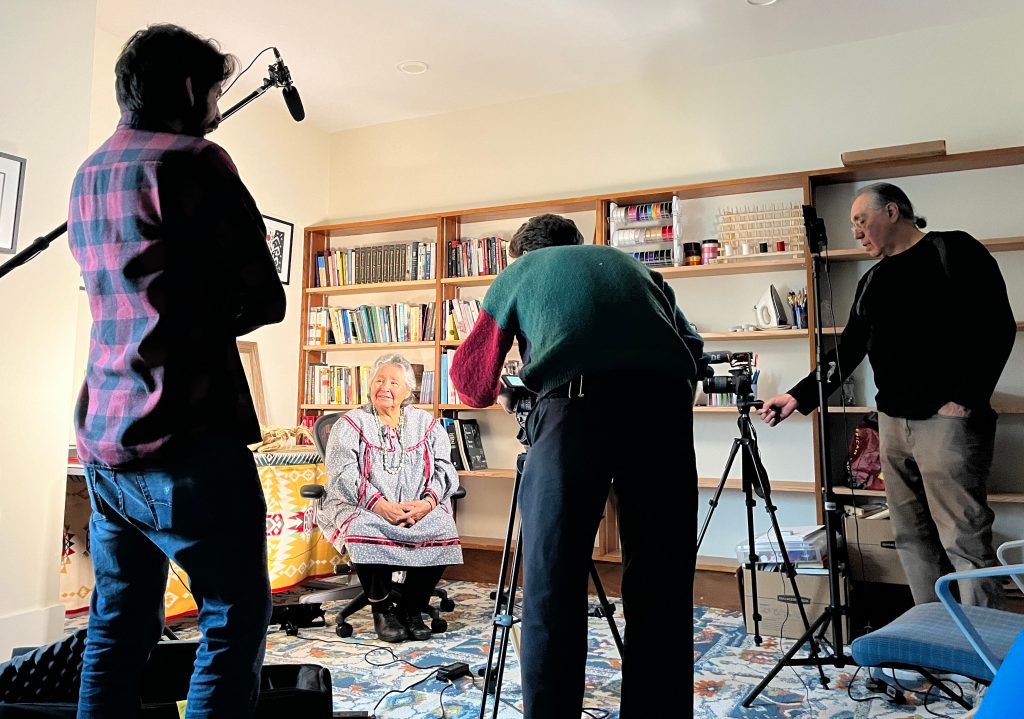
Supported with a $5,000 grant from Maxwell’s Tenth Decade Project and other campus programs, the “Listen to the Elders” series began in the 2022–23 academic year with four presentations by Freida Jacques, who in addition to being a clan mother has served for decades as a Haudenosaunee cultural liaison for educational institutions across New York state and beyond.
During these Skä•noñh events, Jacques led tours of the center and explained how in Haudenosaunee tradition, women choose the clan leaders and men marry into women’s clans rather than vice versa.
In one session, she discussed the enduring impact of the boarding schools run by churches or the federal government that tens of thousands of Indigenous children—including Jacques’ grandfather—were forced to attend between the late 1800s and the 1960s.
In a letter written to support a funding application, Jacques said that sharing her life experiences and knowledge has been fulfilling. “Both grandparents on my mother’s side attended Carlisle Indian Industrial boarding school in Pennsylvania,” she wrote. “My family was affected by this fact. My father was a Mohawk Wolf Clan person and originated at Akwesasne, whose territory is divided by Ontario, Q and New York State. …Building bridges between cultures appears to be one of my life’s purposes.”
Onondaga Chief Spencer Lyons continued the series in 2023-24 with presentations on Haudenosaunee traditions and governance. With free transportation available from campus to Skä•noñh, the “Listen to the Elders” series have consistently drawn capacity crowds.
To read the full story, visit the Maxwell website.
